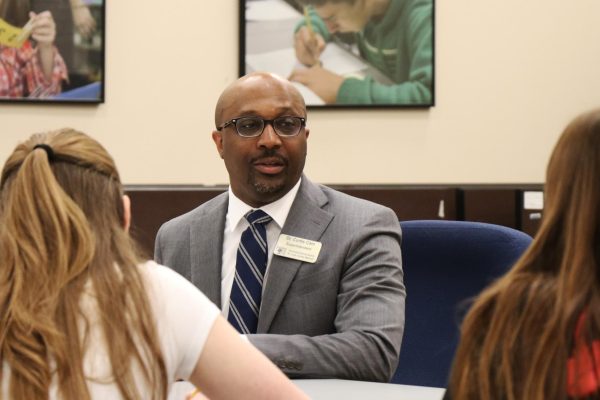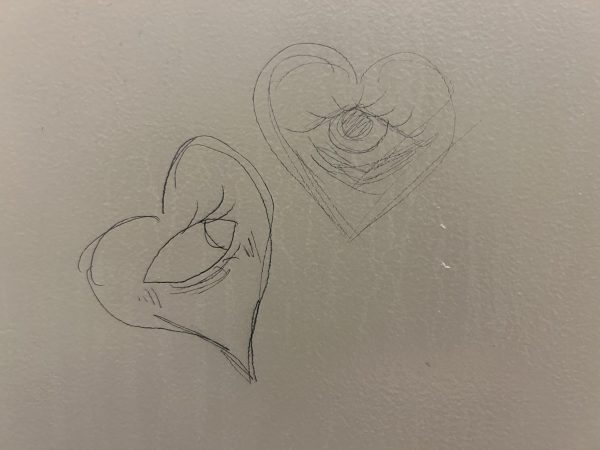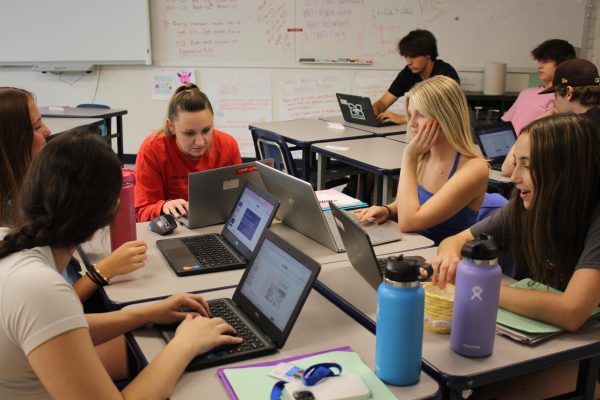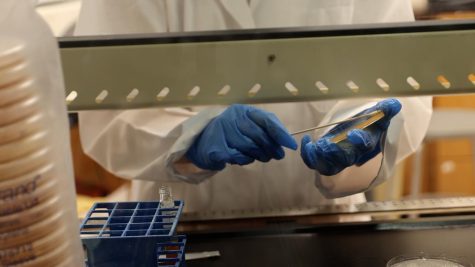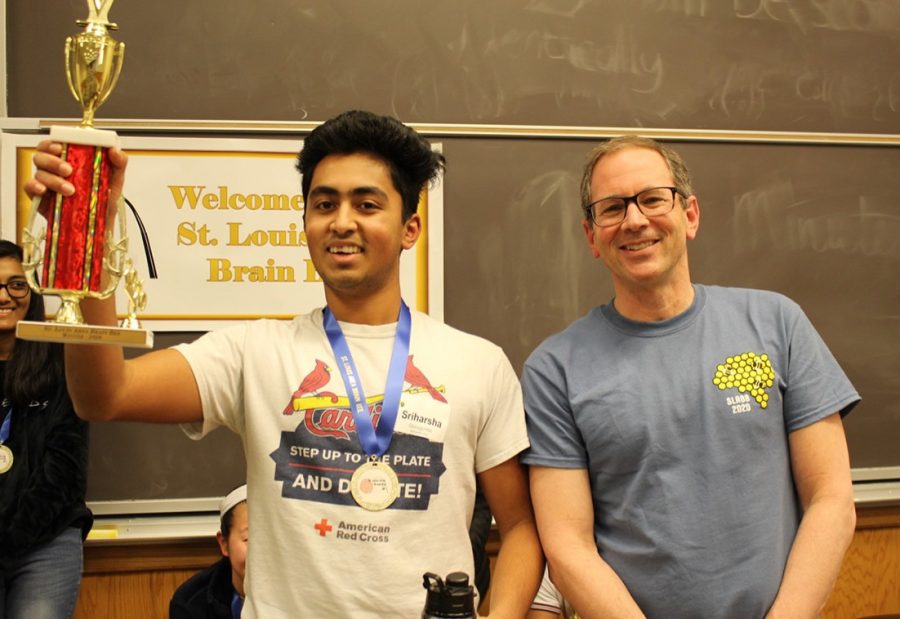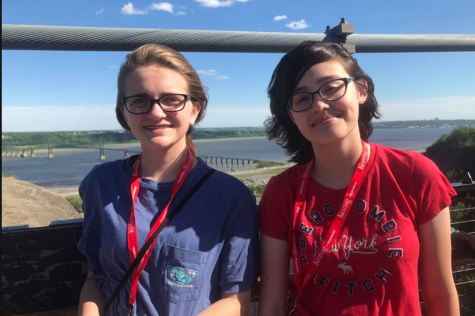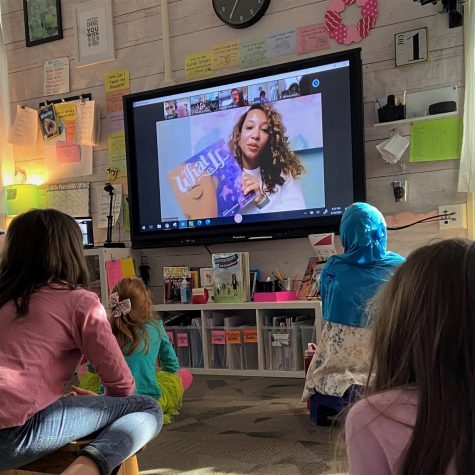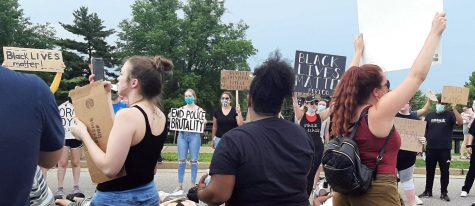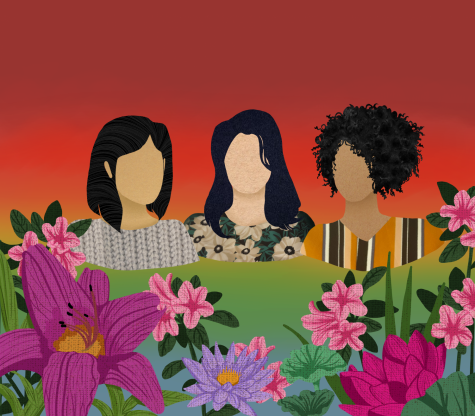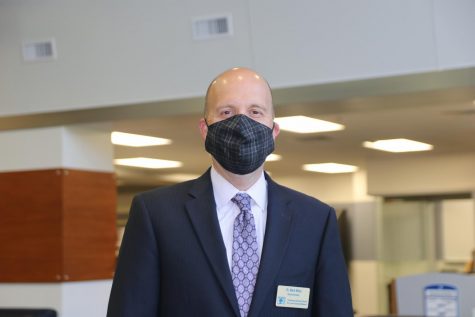Student Wins St. Louis Area Brain Bee
Sriharsha Guduguntla, junior, presents his trophy and stands with Viktor Hamburger Professor of Biology Dr. Erik Herzog, an organizer of the St. Louis Area Brain Bee at Washington University. Guduguntla said he will be working alongside Dr. Herzog in his internship at WashU for a laboratory research topic of choice. “I’m definitely interested in studying neurodegenerative disorders, stem-cells therapy, cancer, metabolism, and how all those fields interact, which is the coolest part.”
Sriharsha Guduguntla, junior, came out victorious against 52 other students representing 20 different local high schools in the tenth annual St. Louis Area Brain Bee (SLABB) held at Washington University Feb. 29.
A brain bee mirrors a spelling bee as it is a competition to display one’s knowledge, not of words, but of neuroscience.
The SLABB affords participants the opportunity to prepare by studying Brain Facts from the Society for Neuroscience, and students engage in hands-on and seminar style learning intertwined with written, verbal, and oral rounds throughout the day.
Guduguntla will receive a paid summer research fellowship at Washington University, and an all-expenses paid trip to compete in the National Brain Bee hosted in Cleveland, Ohio.
He said it is a great honor to represent MHS with his win, and although the National Brain Bee was postponed due to the coronavirus without a definite new date, he is still excited to further explore laboratory and other science research in the summer.
“All these problems that we’ve got from healthcare to politically charged issues like abortion, they are all rooted in science,” Guduguntla said. “Learning more about the brain and the body can give us more insight, and I think science is one of the most important things we should be pursuing.”
He said this competition opens doors for him concerning neuroscience research at his school of interest, Washington University, and connects him with professors and graduate students.
“Neuroscience is linked to who we are, and as we advance technologically in the future, we need to learn more about ourselves to apply ethics among other things,” Guduguntla said.
He said he prepared for three weeks prior to the competition by meticulously studying the contents of the BrainFacts book; however, he faced some challenges studying without a designated sponsor.
“The book we were given was a relatively small book, almost near a 100 pages, but the hardest part was that you had to know all the really small details in the book because it’s not enough to just know the concepts,” Guduguntla said.
He said he participated in the SLABB last year with the goal of advancing to the second round out of three, and he said he now made a goal of making it the top five in the National Brain Bee.
Dr. Cathy Farrar, science teacher, said she knows Guduguntla’s competitive background as she has sponsored events he’s competed in for three years in such as the Science Bowl, the USA Chemistry Olympiad and the USA Bio Olympiad.
“He is an incredibly hard worker and he’s really driven,” Dr. Farrar said. “I would say he is really good at putting diverse ideas together to come up with a solution.”
She said she is happy for Guduguantla’s win and the recognition he has received and said Guduguantla would make the most of his new opportunity from the Brain Bee.
“When you see a kid put that much work and effort into something, which he does in everything, and you see him have success, there’s no comparison to it, and I wouldn’t be any happier if that was my own kid,” Dr. Farrar said.
Alicia Yang, Washington University SLABB student organizer, said a main part of their preparation is student and community outreach efforts to find students interested in neuroscience opportunities. She also said the competition grants students the opportunity to interact with unique objects, such as a human brain donated for their anatomy session, so students can be exposed to more realistic projects.
“The goal is to introduce neuroscience to high schoolers, which is not covered in a lot of- school curriculums, and we have them connect with undergraduate students and panelists so parents and students can see themselves studying neuroscience or continuing it in college,” Yang said.
Yang said her and others student organizers were astonished by the amount of questions students completed this year, and they are excited about their second year of high student turnout and for their ideas to create additional demo opportunities next year.
“All the contests did a really good job, and they blew me away because it was my first time seeing how smart they are and how much work they put into the competition,” Yang said. “The value of the award is that they get to compete in Nationals and meet people across the country who are interested in neuroscience from students and scientists.”
Your donation will support the student journalists of Marquette High School. Your contribution will allow us to purchase equipment and cover our annual website hosting costs. You may become a PATRON by making a donation at one of these levels: White/$30, Green/$50, Blue/$100. Patron names will be published in the print newsmagazine, on the website and once per quarter on our social media accounts.
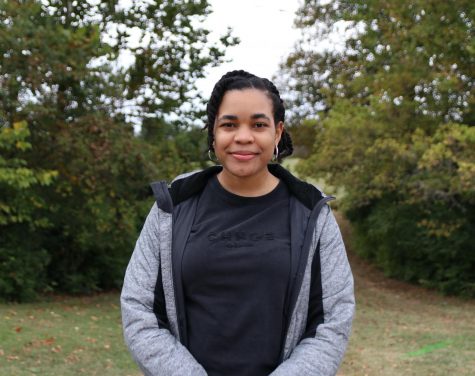
Lauren Pickett, senior, is the In-Depth Editor for the MHS Messenger. This is her second full year on staff. Also, Lauren participates in two other activities:...



